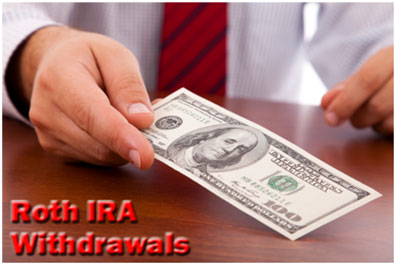 |
 |
|
|
Roth IRA Withdrawals
What are the rules for Roth IRA withdrawals? You need to know. Why? Because if you don't know, then you might get hit with unexpected taxes and/or penalties. In order to insure this doesn't happen to you, you need to make sure your Roth IRA withdrawals are "qualified distributions." Why? Because qualified distributions are tax-free and penalty-free... In order to make sure your withdrawals are qualified distributions, make sure you follow the Roth IRA withdrawal rules.  Roth IRA Withdrawal RulesIn 95% of the cases, all you need to know about Roth IRA withdrawals is covered by the following points:
Commit these Roth IRA rules for withdrawal to memory, and you'll know just about everything you ever need to know about withdrawing funds from your Roth IRA. (We'll let your accountant worry about the rest!) Withdrawals From A Roth IRAWithdrawals from your Roth IRA must follow certain rules established by the IRS. When withdrawing Roth IRA contributions, you must always obey the ordering rules. According to the ordering rules, withdrawals must occur in the following order (in order of first funds out): 1) Principal contributions Principal contributions are never subject to income taxes or early withdrawal penalties, because you made those contributions with after-tax dollars. However, if you're under age 59 ½ or haven't met the requirements of the 5 year rule yet, then your other Roth IRA withdrawals may be subject to income taxes and/or a 10% early withdrawal penalty. So these rules are important. Withdrawing Roth IRA Principal
Unlike a Traditional IRA, you can withdraw funds from your Roth IRA tax-free and penalty-free as long as you're withdrawing an amount equal to or less than your original contribution. Why? Well, it is your money. And since you funded your Roth IRA with after-tax income, you've already paid income tax on it. So you don't need to worry about incurring penalties or taxes when you make Roth IRA principal withdrawals. But you DO have to worry about taxes and penalties if you withdraw the earnings or gains that resulted from your original principal contribution. For example, let's say you contribute $5,000 to your Roth IRA one year. The next year, you decide you need that $5,000 after all. But the $5,000 is now worth $5,500 because your investment gained 10% during the year. You can withdraw the original $5,000, and it won't cost you a penny, because Roth IRA contribution withdrawals are tax-free and penalty-free. But if you withdraw the $500 gain, it's subject to an early withdrawal penalty of 10% as well as income taxes. Roth IRA Early WithdrawalAs previously mentioned, if you withdraw a principal contribution from your Roth IRA, it's always tax-free and penalty-free. However, the same can not be said when it comes to withdrawal of investment gains from your Roth IRA. Age 59 ½ is the effective Roth IRA early withdrawal deadline. Most withdrawals prior to this age will trigger income taxes and an early withdrawal penalty. Roth IRA Withdrawal PenaltyIf you don't meet the IRS requirements for a qualified distribution, you will probably incur a Roth IRA withdrawal tax. This usually comes in the form of income taxes and/or a 10% early withdrawal penalty. Whether or not you're subject to these taxes or not depends on your age and the age of your account. Roth IRA Withdrawals Before Age 59 ½If you're under the Roth IRA withdrawal age of 59 ½, withdrawal of investment gains from your Roth IRA is almost always subject to...
There are a few exceptions, and those are addressed at the end of this article... But, as a general rule, any withdrawal of a Roth IRA investment gain made prior to age 59 ½ is subject to both. Need an example? Let's say you open a Roth IRA and contribute $4,000 in the first year. Three years later, you decide to close your Roth IRA... But the original $4,000 contribution you made is now worth $6,000 due to a 50% investment gain. You can withdraw the original $4,000 contribution tax-free and penalty-free. But the $2,000 investment is subject to... A 10% early withdrawal penalty and income taxes. Assuming a 35% income tax rate, you owe income taxes of $700. Your 10% early withdrawal penalty is $200. So, by closing the account, you owe $900 and walk away with $5,100... Roth IRA Withdrawals After Age 59 ½The Roth IRA withdrawal age at which you can make tax-free, penalty-free Roth IRA distributions is age 59 ½. On the day you turn 59 ½, and any day after that... You can withdraw investment gains from your Roth IRA tax-free and penalty-free. For example, let's say at the age of 30, you invested $5,000 in your Roth IRA and never made another contribution. At age 60, your Roth IRA is worth $20,000. Since you're older than age 59 ½, you can withdraw every penny of that $20,000 tax-free and penalty-free. However, this assumes your Roth IRA meets the 5 year tax holding period. Roth IRA 5 Year Holding PeriodIn order to withdraw investment gains from your Roth IRA tax-free and penalty, even after the age of 59 ½, your original contribution or Roth IRA conversion must have taken place at least five tax years prior to the withdrawal. For example, let's say you opened a Roth IRA in 2007 at age 58 and contributed $5,000. In 2009, even though you're 60 years old, you can NOT withdraw any of the investment gains on the original $5,000 contribution without paying taxes. Why? Because your Roth IRA has not yet met the five-year tax holding period, which is a sort of Roth IRA early withdrawal deadline. Instead, you'll have to wait until January 2012 before you can withdraw investment gains tax-free and penalty-free. Why 2012? Because 5 tax years will have passed by then. 2007... 2008... 2009... 2010... and 2011. Does that make sense? Make sure you remember that the rule applies to the tax year, not the actual year. Why does this matter? Because you have until the April 15 tax deadline to make a contribution to your Roth IRA. So, for sake of argument, let's say you make a $2,000 Roth IRA contribution for the 2008 tax year on April 1, 2009. Your five-year holding period begins ticking in 2008 not 2009, because 2008 is the actual tax year of the contribution. In this example, tax-free and penalty-free distributions can begin in January 2013... Roth IRA Withdrawal ExceptionsSo far we've learned that if you withdraw investment gains from your Roth IRA either... Before reaching the age of 59 ½, Or Before the 5-year tax holding period ends. Then, you're subject to income taxes and a possible 10% early withdrawal penalty. However, certain exceptions do exist, such as Roth IRA withdrawals for the disabled and Roth IRA withdrawals for the unemployed. If any of the following conditions apply, withdrawals of Roth IRA investment gains are NOT subjected to the 10% early withdrawal penalty: 1) You die and your beneficiary closes the account. 2) You become disabled according to the definition in IRS Code Section 72(m)(7) and IRS Publication 590. 3) You receive a series of "substantially equal periodic payments" based on your current life expectancy. 4) You use the withdrawn funds to pay qualified higher education expenses for either yourself and/or eligible family members. 5) You use the withdrawn funds to pay for the cost of purchasing a first home (limited to $10,000). 6) You use the withdrawn funds to pay for unreimbursed medical expenses which exceed 7 1/2% of your Adjusted Gross Income (AGI). 7) You use the withdrawn funds to pay for medical insurance premiums after receiving unemployment benefits for more than 12 weeks. 8) You use the withdrawn funds to pay back taxes due to an IRS levy placed against you. However, keep in mind that these are rare exceptions. Make sure you consult your accountant before taking advantage of any one of these exceptions. Otherwise, you run the risk of getting hit with an unexpected tax bill, IRS penalties, or worse...
Check out our new Facebook Page and follow us on Twitter!
Return to the top of Roth IRA Withdrawals Return to the Your Roth IRA Website Homepage
|
What's New?Read 5 Reasons Why I Love My Roth IRA, our part in the Good Financial Cents Roth IRA Movement! Start planning ahead for next year by checking out 2017 Roth IRA contribution limits, and stay alert to this year's changes to the 2016 Roth IRA contribution limits. Our family fully funds our Roth IRA with this website. Learn how you can do it too. Are you confused or frustrated by the stock market? Learn how to build real wealth selecting individual stocks for your Roth IRA... Read more about what's new on the Roth IRA blog. Hi, I'm Britt, and this is my wife, Jen. Welcome to our Roth IRA information website! This is our humble attempt to turn a passion for personal finance into the Web's #1 resource for Roth IRA information. But, believe it or not, this site is more than just a hobby. It's a real business that provides a stable and steady stream of income for our family. In fact, because of this site, Jen is able to be a full-time stay-at-home mom and spend more time with our daughter, Samantha. But you want to know the best part? ...You can do the same thing! Anyone with a hobby or a passion (even with no previous experience building a website) can create a profitable site that generates extra income. If you're tired of solely depending on your job(s) for family income, click here now and learn why our income is increasing despite the financial crisis and how we're making our dreams come true. |
|
Search This SiteRoth IRA BasicsMore About Roth IRAsRoth IRA ResourcesAbout Your Roth IRALike Us On FacebookFollow Us On Twitter
RSSDisclaimerThe information contained in Your Roth IRA is for general information purposes only and does not constitute professional financial advice. Please contact an independent financial professional when seeking advice regarding your specific financial situation. For more information, please consult our full Disclaimer Policy as well as our Privacy Policy. Thank YouOur family started this site as a labor of love in February 2009, a few months after our daughter was born. Thank you for helping it become one of the most visited Roth IRA information sites. Thank you, too, to the "SBI!" software that made it all possible. We hope you find what you're looking for and wish you much continued success in your retirement planning! |
||
|
| ||






